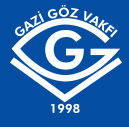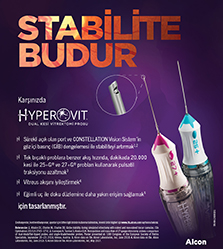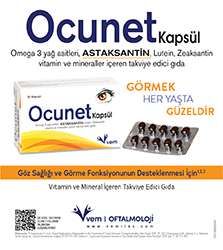Retina-Vitreous
2010 , Vol 18 , Num 1
Anti-Vascular Endothelial Growth Factor Therapies for Retinal Vein Occlusion
1Çorlu Asker Hastanesi, Göz Hastalıkları Kliniği, Tekirdağ, Uzm. Dr.2Elazığ Eğitim Ve Araştırma Hastanesi, Göz Hastalıkları Kliniği, Elazığ, Doç. Dr. Retinal vein occlusion (RVO) is the second most common retinal vascular disorder after diabetic retinopathy and is a significant cause of visual lost. Decreased visual acuity can be secondary to macular capillary nonperfusion, macular edema, retinal hemorrhage, retinal detachment, vitreous hemorrhage, or neovascular glaucoma. Until recently primary concern after RVO was prevention of neovascular glaucoma by early detection of the development of iris neovascularization and its prompt treatment with retinal laser photocoagulation. New therapeutic approaches predominately aim at visual recovery by reduction of macular edema but currently there is no proven gold standard therapy for treatment of RVO. Vascular endothelial growth factor (VEGF) is a stimulus for persistent capillary leakage and neovascularization in retinal vascular diseases. Increased VEGF concentrations have been found in intraocular fluid samples from patients with central retinal vein occlusion and branch retinal vein occlusion. The pharmacologic inhibition of VEGF appears to be a promising treatment in RVO. Currently intravitreal anti VEGF agents, bevacizumab, ranibizumab, pegaptanib sodium were used in the treatment of RVO. The main drawback of this new treatment modality is the short durability of the therapeutic effect with the need for frequent retreatments. Most of the studies with anti VEGF agents in RVO are noncontrolled and have short-moderate follow-up, which limit generalizability of their results. Further randomized, controlled investigations are needed to assess long-term safety and efficacy of intravitreal anti VEGF agents in the treatment of RVO. Keywords : Bevacizumab, pegaptanib sodium, ranibizumab, retinal vein occlusion




